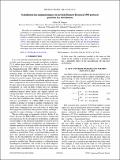Scintillation has minimal impact on far-field Bennett-Brassard 1984 protocol quantum key distribution
Author(s)
Shapiro, Jeffrey H.
DownloadShapiro-2011-Scintillation has minimal impact on far-field Bennett-Brassard 1984 protocol.pdf (203.1Kb)
PUBLISHER_POLICY
Publisher Policy
Article is made available in accordance with the publisher's policy and may be subject to US copyright law. Please refer to the publisher's site for terms of use.
Terms of use
Metadata
Show full item recordAbstract
The effect of scintillation, arising from propagation through atmospheric turbulence, on the sift and error probabilities of a quantum key distribution (QKD) system that uses the weak-laser-pulse version of the Bennett-Brassard 1984 (BB84) protocol is evaluated. Two earth-space scenarios are examined: satellite-to-ground and ground-to-satellite transmission. Both lie in the far-field power-transfer regime. This work complements previous analysis of turbulence effects in near-field terrestrial BB84 QKD [ J. H. Shapiro Phys. Rev. A 67 022309 (2003)]. More importantly, it shows that scintillation has virtually no impact on the sift and error probabilities in earth-space BB84 QKD, something that has been implicitly assumed in prior analyses for that application. This result contrasts rather sharply with what is known for high-speed laser communications over such paths, in which deep, long-lived scintillation fades present a major challenge to high-reliability operation.
Date issued
2011-09Department
Massachusetts Institute of Technology. Department of Electrical Engineering and Computer Science; Massachusetts Institute of Technology. Research Laboratory of ElectronicsJournal
Physical Review A
Publisher
American Physical Society (APS)
Citation
Shapiro, Jeffrey. “Scintillation Has Minimal Impact on Far-field Bennett-Brassard 1984 Protocol Quantum Key Distribution.” Physical Review A 84.3 (2011): n. pag. Web. 16 Feb. 2012. © 2011 American Physical Society
Version: Final published version
ISSN
1050-2947
1094-1622